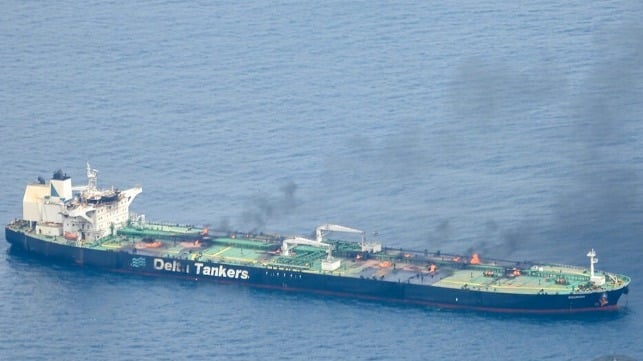Salvors Plan to Resume Tow of Burned Tanker Sounion in Red Sea

Salvors plan to resume work on removing the damaged tanker Sounion, which was attacked multiple times by Houthi rebels and abandoned on August 21. The operation to save the laden tanker from a disastrous sinking was interrupted earlier this month due to safety concerns, and will resume shortly under the protection of a European warship escort.
The Greek-flagged tanker Sounion was northbound in the Red Sea on August 21 when it was approached by two small boats. There was an exchange of small arms fire, and the boats withdrew. Two hours later, the tanker reported that it had been hit by two “projectiles" and sustained minor damage, but the vessel continued under its own power. Less than an hour later, the vessel was struck again, disabling the engine and leaving the ship adrift. The Indian Navy dispatched forces to safely evacuate the crew.
Houthi fighters returned to the abandoned ship later to plant explosive charges on deck. The blasts tore multiple holes in the vessel's cargo tanks, and the ship burned for more than a week afterwards - but did not sink.

that matters most
Get the latest maritime news delivered to your inbox daily.
Western governments have warned that the terrorist group's action could cause a devastating oil spill in the Red Sea, up to four times larger than the Exxon Valdez disaster - with serious consequences for the environment and for subsistence fisheries. A salvage mission with several large tugs got under way to take the vessel in tow, but stalled shortly after arrival - even though Houthi forces had agreed to allow salvors access to the vessel. One day after work began on site, EUNAVFOR - the European naval mission assigned to protect the tugs - issued a brief statement saying that other alternatives would be explored.
On Thursday, unnamed sources close to the salvage operation told Reuters that it would resume within two days. The tow will be technically challenging, according to those involved, because the vessel is damaged and in laden condition, adding considerable downside risk in the event of any mishap. If its cargo were fully released, it could be the largest oil spill from a ship on record. It is also unknown if the Houthis may have left any unexploded ordnance aboard the vessel after their activities on board.
